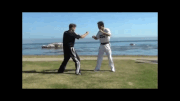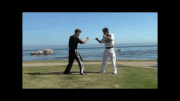windwalker099
Master Black Belt
A teacher I had trained under a long time ago....because of his real world experience.
not really possible to spar with him safely.

Mr Park n-mantis, practicing with a friend of mine Roger Haygood
in the 70s...Roger would later go on to study s-mantis
"
His name is also romanized as: Park Chi Moon.
Shifu Park Chil Sung was born in 1930 in what is now North Korea. He first began studying gong fu within his family at a very young age (around 7 or 8 years old).
He later traveled around the Korean peninsula studying under any master he could find. At that time he met his main master, shifu Lin Ping Jiang.
During the Korean war he along with most other young men from his home town were recruited to fight for the south as guerilla fighters not actually associated with the formal army.
After the war he was able to relocate to the south and has not seen his family since then.
Shifu Park Chil Sung worked for some time after the war for the South Korean equivalent of the American CIA, training in hand to hand combat.
He has been teaching at Camp Casey Tongdushon (a U.S. Army post just south of the DMZ - north of Seoul) since the 70's, with many of his students being U.S. Military personnel. In the year 2000 he was still alive and teaching in Korea."
not really possible to spar with him safely.

Mr Park n-mantis, practicing with a friend of mine Roger Haygood
in the 70s...Roger would later go on to study s-mantis
"
His name is also romanized as: Park Chi Moon.
Shifu Park Chil Sung was born in 1930 in what is now North Korea. He first began studying gong fu within his family at a very young age (around 7 or 8 years old).
He later traveled around the Korean peninsula studying under any master he could find. At that time he met his main master, shifu Lin Ping Jiang.
During the Korean war he along with most other young men from his home town were recruited to fight for the south as guerilla fighters not actually associated with the formal army.
After the war he was able to relocate to the south and has not seen his family since then.
Shifu Park Chil Sung worked for some time after the war for the South Korean equivalent of the American CIA, training in hand to hand combat.
He has been teaching at Camp Casey Tongdushon (a U.S. Army post just south of the DMZ - north of Seoul) since the 70's, with many of his students being U.S. Military personnel. In the year 2000 he was still alive and teaching in Korea."


